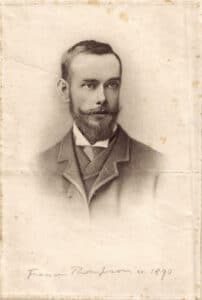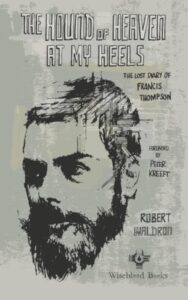
Robert Waldron invents a diary about the creation of a poem
I’d heard of the poem “The Hound of Heaven” decades ago; I’d read it back in college in an English literature course that used the Norton Anthology of English Literature. I checked my copy, which I’ve held on to since 1971; sure enough, it’s included. But I remembered nothing about the poet, Francis Thompson (1859-1907). As it turns out, I’m not alone; his name doesn’t come immediately to mind when thinking about the great Victorian and late Victorian poets.
Thompson’s story begins with his father, Charles, who was a doctor and Roman Catholic convert in northwest England. Charles wanted his son to be a priest, and the boy at age 11 was duly sent to seminary. Francis, however, was far more interested in history and poetry than theology. When the priesthood plan failed, his father sent him to study medicine at what is now the University of Manchester. Thompson was even less interested in being a doctor than he was in being a priest and left for London. Determined to be a writer, he found himself living on the streets, working in fits and starts, and soon addicted to opium.

Francis Thompson in 1890
With no fixed address, Thompson sent his poetry to the Merrie England Magazine, edited by Wilfrid and Alice Meynell. Wilfrid filed it for a year, found it, tried to find Thompson, and in desperation published it. The Meynells took Thompson into their home; eventually bringing him to Our Lady of England Abbey in Sussex, in hopes of curing him of his opium addiction. The nine months of 1889 Thompson spent there did effect a temporary cure, and it was at the abbey that he composed several poems, including “The Hound of Heaven.” He became known as a poet, publishing several collections, but a few years later returning to his opium habit. His death at 48 in 1907 was attributed to tuberculosis, intensified by the underlying drug addiction.
It’s the nine months at the abbey that writer Robert Waldron imagines in The Hound of Heaven at My Heels (2014), a fictitious account of a supposed diary kept by Thompson during his stay there. It’s written chronologically in diary style, including excerpts of various poems and (at the end) the complete text of “The Hound of Heaven.” The work is set at a time in Thompson’s life right before he becomes known, and the unspoken question is whether he’ll survive his addiction and publish more poetry.
Waldron does an outstanding job of imagining the mind of the rather frail, physically slight, and mentally feverish poet. He has Thompson recording events of his days, the services he’s attending, the walks he takes, and especially his conversations with the monk who is his mentor. What we see is a man convinced he’s being chased down by God, constantly thinking of the opium he’s not taking, writing poems in bursts of creativity, and experiencing guilt for disappointing his father.
“The Hound of Heaven” is Thompson’s most famous poem. It’s not difficult to see why playwright Eugene O’Neill could recite it by heart, and why Thompson’s poetry generally influenced G.K. Chesterton, J.R.R. Tolkien, and Madeleine L’Engle. The poem was also taught in Catholic schools for most of the 20th century.
This is how the poem begins:
From “The Hound of Heaven”:

I fled Him, down the arches of the years;
I fled Him, down the labyrinthine ways
Of my own mind; and the mist of tears
I hid from Him, and under running laughter.
Up vistaed hopes, I sped;
And shot, precipitated,
Adown Titanic glooms of chasmed fears,
From those strong Feet that followed, followed after
But with unhurrying chase,
And unperturbed pace,
Deliberate speed, majestic instancy,
They beat—and a Voice beat
More instant than the Feet—
“All things betray thee, who betrayest Me.”
The poem contains some rather dazzling images: down the nights and days; labyrinthine ways, mist of tears, vistaed hopes, chasmed fears, unhurrying pace, majestic instancy – it’s a veritable compendium of phrases that cascade one after another. And this is only the beginning of the poem; it continues for five more (and even longer) stanzas, each full of imaginative phrasing and images.

Robert Waldron
Fiction it may be, but Waldron has managed to bring the poet to vivid life.
Waldron has published a number of works about poets, poetry, and faith, including Thomas Merton in Search of His Soul; Walking with Gerard Manley Hopkins: A Poetic Journey; Poetry as Prayer: Thomas Merton; Poetry as Prayer: The Hound of Heaven; Walking with Thomas Merton: Discovering His Poetry, Essays, and Journals; The Wounded Heart of Thomas Merton; 15 Days of Prayer with Henry Nouwen; The Secret Dublin Diary of Gerard Manley Hopkins; Blue Hope: A Novella; and Walking with Kathleen Norris: A Contemplative Journey. He received his B.A., M.A., and M.Ed. degrees from the University of Massachusetts and received four fellowships for the National Endowment for the Humanities. He lives in Boston.
In The Hound of Heaven at My Heels, Waldron provides an invitation to read a poet who deserves to be better known (and better read). He tells a story that puts the reader inside that sparsely furnished monk’s cell, watching a poet wrestle his inner demons, his poetic gift, and his physical addiction. And we cheer when he succeeds, even if we know it’s only for a few years.
Related:
In 2021, Delphi Classics published The Complete Works of Francis Thompson Illustrated as an ebook on Amazon Kindle. Priced at $2.99, the volume includes an introduction, Thompson’s complete poetic and prose works, a biography published in 1913, and numerous photographs of Thompson, his birthplace, and related scenes of his life.
Photo by Tambako the Jaguar, Creative Commons, via Flickr. Post by Glynn Young.
How to Read a Poem uses images like the mouse, the hive, the switch (from the Billy Collins poem)—to guide readers into new ways of understanding poems. Anthology included.
“I require all our incoming poetry students—in the MFA I direct—to buy and read this book.”
—Jeanetta Calhoun Mish
- “Your Accent! You Can’t Be from New Orleans!” - October 9, 2025
- Poets and Poems: Donna Vorreyer and “Unrivered” - October 7, 2025
- Poet Sidney Lanier and the Lost Cause - October 2, 2025


Leave a Reply